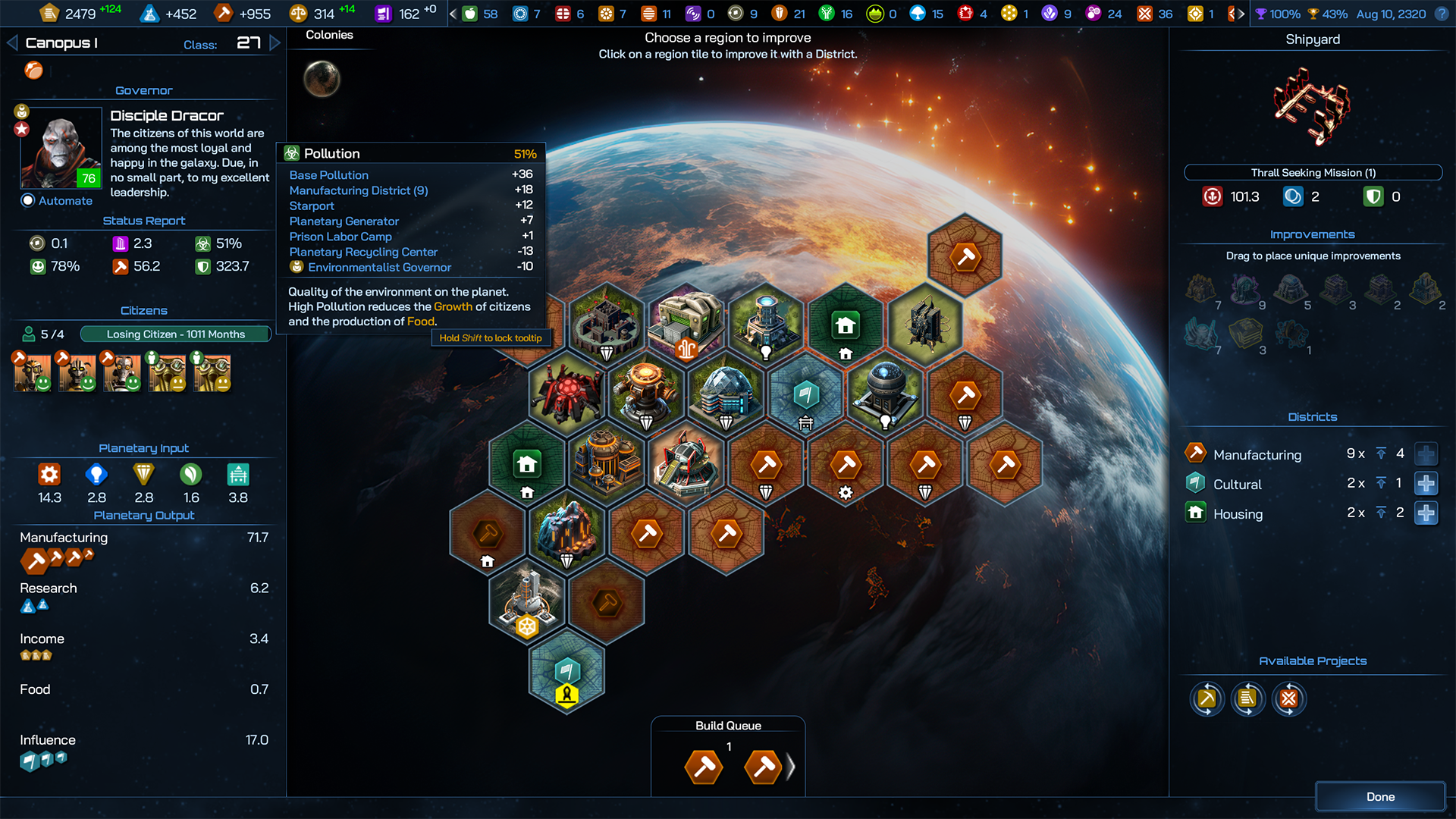Pollution: Difference between revisions
Kerri405848 (talk | contribs) (Created page with "{{SectionTemplate |h=h2 |title=Pollution |content=500px<br> Pollution is a measure of the ecological damage on a world and is recorded as a percentage. Each planet will have a base Pollution level which is then further increased by polluting Districts and Improvements, Civilization Policies, various in-game Events, some Executive Orders and so on, while some of these will reduce Pollution instead. Pollution directly modifies both Food productio...") |
No edit summary |
||
| Line 1: | Line 1: | ||
<h3>Pollution</h3> | |||
[[File:Pollution.png|500px]]<br> | |||
Pollution is a measure of the ecological damage on a world and is recorded as a percentage. | Pollution is a measure of the ecological damage on a world and is recorded as a percentage. | ||
| Line 10: | Line 8: | ||
Pollution directly modifies both Food production and the Growth rate on a Core World, being applied as a percentage multiplier to both. For example, 51% Pollution will modify both Food and Growth by *0.51, more than halving their respective outputs. Therefore, high levels of Pollution are incredibly damaging to the overall Growth rate of your Citizens, especially if your Civilization-wide Food production is dropped to 0 or less, which would halt all Growth completely. | Pollution directly modifies both Food production and the Growth rate on a Core World, being applied as a percentage multiplier to both. For example, 51% Pollution will modify both Food and Growth by *0.51, more than halving their respective outputs. Therefore, high levels of Pollution are incredibly damaging to the overall Growth rate of your Citizens, especially if your Civilization-wide Food production is dropped to 0 or less, which would halt all Growth completely. | ||
Increasing Pollution also negatively affects each | Increasing Pollution also negatively affects each Citizen’s Approval, which in turn reduces Manufacturing and Research Planetary Outputs. | ||
Certain Citizens are more or less tolerant to living on heavily Polluted worlds: the Irradiated Citizens of the Cosmic Contaminant thrive in radioactive sludge while the plant-based Baratak are extremely sensitive to even rather light levels of Pollution. | Certain Citizens are more or less tolerant to living on heavily Polluted worlds: the Irradiated Citizens of the Cosmic Contaminant thrive in radioactive sludge while the plant-based Baratak are extremely sensitive to even rather light levels of Pollution. | ||
Revision as of 16:16, 8 January 2024
Pollution
Pollution is a measure of the ecological damage on a world and is recorded as a percentage.
Each planet will have a base Pollution level which is then further increased by polluting Districts and Improvements, Civilization Policies, various in-game Events, some Executive Orders and so on, while some of these will reduce Pollution instead.
Pollution directly modifies both Food production and the Growth rate on a Core World, being applied as a percentage multiplier to both. For example, 51% Pollution will modify both Food and Growth by *0.51, more than halving their respective outputs. Therefore, high levels of Pollution are incredibly damaging to the overall Growth rate of your Citizens, especially if your Civilization-wide Food production is dropped to 0 or less, which would halt all Growth completely.
Increasing Pollution also negatively affects each Citizen’s Approval, which in turn reduces Manufacturing and Research Planetary Outputs.
Certain Citizens are more or less tolerant to living on heavily Polluted worlds: the Irradiated Citizens of the Cosmic Contaminant thrive in radioactive sludge while the plant-based Baratak are extremely sensitive to even rather light levels of Pollution.
